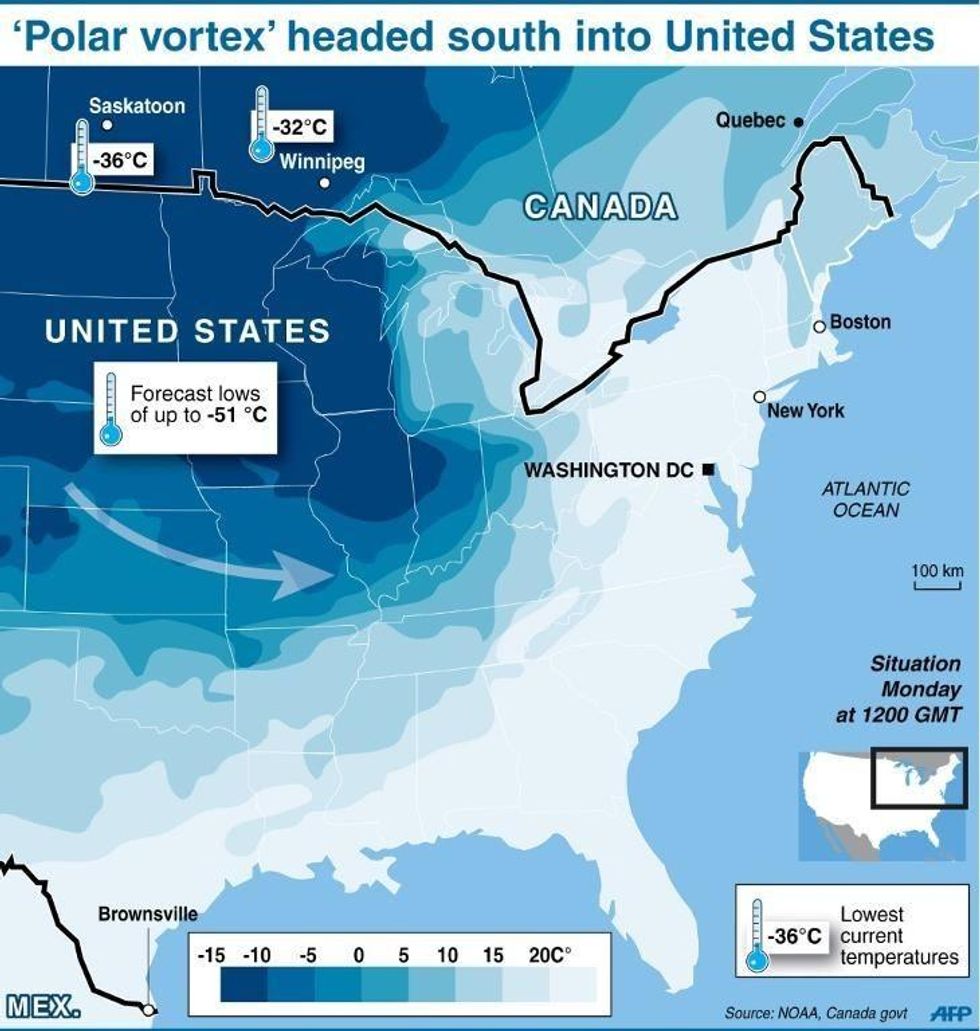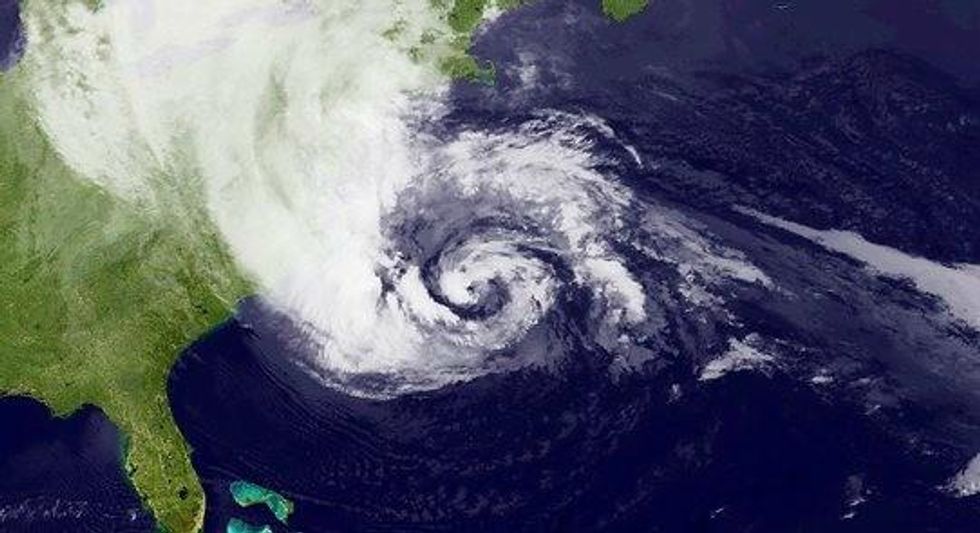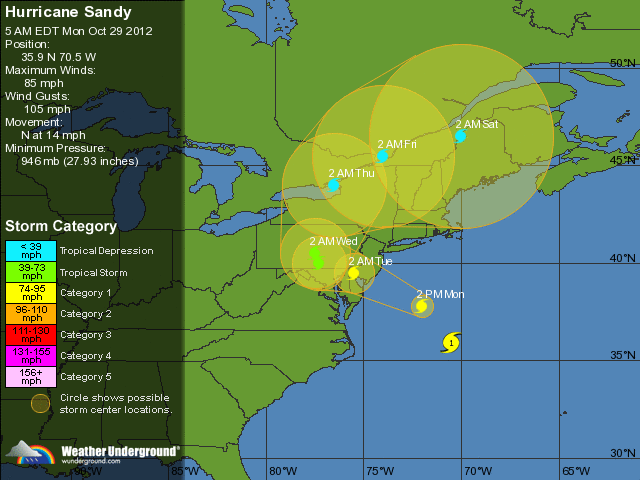

SUBSCRIBE TO OUR FREE NEWSLETTER
Daily news & progressive opinion—funded by the people, not the corporations—delivered straight to your inbox.
5
#000000
#FFFFFF
To donate by check, phone, or other method, see our More Ways to Give page.


Daily news & progressive opinion—funded by the people, not the corporations—delivered straight to your inbox.
NASA this weekend released new data which shows that February 2016 was not only the hottest in recorded history, but it soared past all previous records, prompting scientists to describe the announcement as "an ominous milestone in our march toward an ever-warmer planet."
The average global surface temperature for February was 1.35degC warmer than the global average for the month between 1951-1980--a margin that shattered the previous record of 1.14degC, which was set just one month earlier--and exceeded preliminary figures released earlier this month.
"NASA dropped a bombshell of a climate report," wrote meteorologists Bob Henson and Dr. Jeff Masters, founder of the Weather Underground. "February 2016 has soared past all rivals as the warmest seasonally adjusted month in more than a century of global record keeping."
February's new temperature record beat that set in January 2016 by a full 0.21degC, which Masters and Henson described as "an extraordinary margin."
"We are in a kind of climate emergency now."
--Stefan Rahmstorf, Potsdam Institute of Climate Impact Research
Scientists are normally wary of highlighting a single month's temperature spike, particularly in an El Nino cycle. However, this record bests even the one set during the Super El Nino of February 1998 by 0.47degC.
Stefan Rahmstorf, from Germany's Potsdam Institute of Climate Impact Research and a visiting professorial fellow at the University of New South Wales, told the Sydney Morning Herald that the new figures are "quite stunning ... it's completely unprecedented."
And given the increasing concentration of carbon in the global atmosphere, which is driving higher long-term temperature increases as well as other extreme weather events, the string of monthly records is a foreboding sign.
Henson and Masters explain:
The real significance of the February record is in its departure from the seasonal norms that people, plants, animals, and the Earth system are accustomed to dealing with at a given time of year. Drawing from NASA's graph of long-term temperature trends, if we add 0.2degC as a conservative estimate of the amount of human-produced warming that occurred between the late 1800s and 1951-1980, then the February result winds up at 1.55degC above average. If we use 0.4degC as a higher-end estimate, then February sits at 1.75degC above average. Either way, this result is a true shocker, and yet another reminder of the incessant long-term rise in global temperature resulting from human-produced greenhouse gases.
They conclude, "we are now hurtling at a frightening pace toward the globally agreed maximum of 2.0degC warming over pre-industrial levels."
And Rahmstorf also notes, "We are in a kind of climate emergency now."

Weather isn't climate and the climate isn't weather, but if someone asks whether the 'polar vortex' now being experience by tens of millions of people across the country is driven by climate change, you don't have to wait for the next wave of scientific research to come out. The answer is 'Yes.'
Sadly and predictably, however--as much of the nation faces the coldest temperatures seen in nearly two decades on Monday and into Tuesday-- the push of bone-chilling arctic air into southern Canada and much of the United States has the climate change denialists pushing their familiar falsehoods about how near-record lows nationwide somehow disproves global warming.
In just one example, multi-millionaire and political pundit Donald Trump took to Fox News on Monday morning to say that the freezing temperatures help prove that there is a great "hoax" around climate change. "You know," Tump said when asked to explain, "I think the scientists are having a lot of fun."
On Monday, federal and state agencies issued dire warnings about freezing temperatures that have blanketed the midwest, saying that millions of Americans are under threat by windchill temperatures today and tomorrow that could be life-threatening. Temperature readings, factoring in windchill effect, were reported as low as -63degF in Montana and -50degF in places in North Dakota and Minnesota.

But the effort by Trump and others to portray the phenomenon known as the "arctic vortex" as some an event that discredits the international scientific consensus on the relationship between industrial society's relationship to planetary climate change, however, is being met with a firm rebuke of its own by climate activists, weather experts, and scientists.
As climate justice campaigner Jamie Henn of 350.org tweeted Monday:
\u201cNo, the cold snap doesn't mean global warming is over, the Arctic is just drunk: https://t.co/COonWg0Yhd\u201d— Jamie Henn (@Jamie Henn) 1389034625
The article referenced by Henn, wrriten by Greg Landen at ScienceBlogs.com, says that the "apparent contrast between extreme cold and global warming is actually an illusion."
In what way? Landen continues:
The Polar Vortex, a huge system of moving swirling air that normally contains the polar cold air, has shifted so it is not sitting right on the pole as it usually does. We are not seeing an expansion of cold, an ice age, or an anti-global warming phenomenon. We are seeing the usual cold polar air taking an excursion.
So, this cold weather we are having does not disprove global warming.
In fact, it may be because of global warming. The Polar Vortex can go off center any given winter, but we have been having some strange large scale weather activity over the last few years that is thought to be related to global warming that may have contributed to this particular weather event (explained here). This may be an effect of this strangeness, though the jury is still probably out on this particular weather event.
According to Dr. Dim Coumou, a senior scientist at the Potsdam Institute for Climate Impact Research (PIK) near Berlin, who spoke to Agence France-Presse, what drives the polar vortex is the difference in temperature between the Arctic region and those in the mid-latitudes closer to the equator.
"The reason why we see these strong meanderings is still not fully settled," Coumou told AFP, "but it's clear that the Arctic has been warming very rapidly. We have good data on this. Arctic temperatures have risen much more than other parts of the globe."
The idea that any particular "weather event" is or is not climate change, however, belies the deeper fact that all weather events are complex results of underlying climate conditions. As Jim Naureckas, a journalist at the media watchdog group FAIR, explained to his readers in the aftermath of Typhoon Haiyan in the Philippines last year, "attributing particular weather events to climate change is ridiculously easy."
The reason for that, he continues, is because (emphasis his):
"Every weather event in the modern world is attributable to climate change. This is because weather is a chaotic system, which is to say it varies wildly based on initial conditions. Once we raised global temperature by a degree Celsius--which is an enormous intervention in the physical world--we irrevocably changed all weather, producing an entirely different set of events than the ones that would have otherwise occurred."
In other words, the whole debate about whether this hurricane, that tornado, or the current 'polar vortex' is or isn't climate change misses the point.
Writing about the climate dynamics that are driving the current 'polar vortex' event Jeff Masters, meteorologist and founder of the popular Wunderground blog, explains:
In the winter, the 24-hour darkness over the snow and ice-covered polar regions allows a huge dome of cold air to form. This cold air increases the difference in temperature between the pole and the Equator, and leads to an intensification of the strong upper-level winds of the jet stream. The strong jet stream winds act to isolate the polar regions from intrusions of warmer air, creating a "polar vortex" of frigid counter-clockwise swirling air over the Arctic. The chaotic flow of the air in the polar vortex sometimes allows a large dip (a sharp trough of low pressure) to form in the jet stream over North America, allowing the Arctic air that had been steadily cooling in the northern reaches of Canada in areas with 24-hour darkness to spill southwards deep into the United States. In theory, the 1.5degF increase in global surface temperatures that Earth has experienced since 1880 due to global warming should reduce the frequency of 1-in-20 year extreme cold weather events like the current one. However, it is possible that climate change could alter jet stream circulation patterns in a way that could increase the incidence of unusual jet stream "kinks" that allow cold air to spill southwards over the Eastern U.S., a topic I have blogged about extensively, and plan to say more about later this week.
Lastly, this video posted at the Mother Nature Network and featuring Masters as well as Rutgers University professor Jennifer Francis, helps explain the dynamics by which a warming planet can result in freezing cold weather patterns and extremes of all kinds:
Climate, Ice, and Weather WhiplashNew video couples interviews with two experts -- Rutgers' Jennifer Francis and Weather Underground's Jeff Masters -- to explore ...

As Superstorm Sandy makes landfall on Monday, meteorologists predict a powerful storm that will cause power outages for millions, a storm surge creating massive inland and coastal flooding, and sustained winds that are threat for those living in urban and more rural areas across the northeast.
"Sandy is going to cause billions of dollars in damage Monday and Tuesday in the Eastern U.S. due to storm surge, high winds, and heavy rains," wrote meteorologist Jeff Masters late Sunday. "Sandy is of near record-size, with tropical storm-force winds extending up to 520 miles from its center, covering an area larger than a Texas-and-a-half."
Stu Ostro, senior meteorologist for the Weather Channel, said early Monday: "History is being written as an extreme weather event continues to unfold, one which will occupy a place in the annals of weather history as one of the most extraordinary to have affected the United States."
"I cannot recall ever seeing model forecasts of such an expansive areal wind field with values so high for so long a time," said one expert from the National Weather Service. "We are breaking new ground here."
"The time for preparing and talking is about over," Federal Emergency Management Administrator Craig Fugate told reporters as Sandy moved up the Atlantic coast and said the its collision course with other systems could make it one of the most fearsome storms on record in the U.S. "People need to be acting now."
Overall storm predictions by Weather Nation TV's Paul Douglas (listed in rough order of priority, in terms of damage potential and number of people/companies impacted):
1). Storm surge: we expect the worst storm surge flooding out ahead of Sandy to take place late morning, again late evening on Monday, coinciding with high tide (and a full moon Monday PM hours). Tides are already 2-3 feet higher than average due to astronomical conditions - Sandy's sustained winds and low pressure (28.25") will create a dome of water that will be pushed ashore in two major surges: 9 am - noon, again 9 pm - midnight Monday.
2). Winds: sustained winds of 50-75 mph are likely in a 300 mile swath Monday and Monday night, the strongest winds over southern New England and Long Island Monday PM hours, with gusts over 90 mph at times. There will be wind damage, downed trees and power lines - I expect a rash of power outages. Companies with well-maintained generators will be glad they made that investment by midday Monday.
3). Inland flooding. One bit of (better) news: the rainfall amounts from Sandy don't look quite as extreme as they did 2-3 days ago. Some 4-8" amounts are still likely from the Delmarva Peninsula to coastal New Jersey, but New York, Long Island and most of southern New England will probably receive less than 3-5" of rain - still capable of flash flooding, but not the (historic) rainfall amounts we feared last week. One complicating factor: leaves. The timing is problematic, with leaves on the ground, leaves that will be swept into storm sewers, exacerbating the flood risk and accelerate the backing up of water in many residential and commercial areas.
5 Day Tracking map:

State by state predictions provided by meterologists at Weather Underground:
Maine
* Storm tide and surge: 1 to 2 feet of storm surge on top of tides.
* Wind: 30 to 40 mph with gusts up to 60 mph. The strongest winds will occur Monday afternoon and evening.
* Rain: Widespread totals from 1 to 3 inches, with isolated amounts up to 5 inches
* Inland Flooding: Significant urban and small stream flooding is possible, which could linger into Tuesday.
* Power outages: Spotty power outages are possible as wind takes down branches and trees.
Massachusetts
* Storm tide and surge: Up to 4 feet of storm surge on top of tides, with a 10-20% chance of surge exceeding 5 feet.
Storm tide forecast for Buzzards Bay, MA is 7-8 feet.
Storm tide forecast for Woods Hole, MA is 6-7 feet.
Storm tide forecast for Nantucket, MA is 6-7 feet.
* Wind: 25 to 35 mph with gusts up to 60 mph. The strongest winds will occur Monday afternoon and evening
* Rain: Widespread totals from 1.5 to 3 inches, with isolated amounts up to 5 inches
* Inland Flooding: Significant urban and small stream flooding is possible, which could linger into Tuesday.
* Power outages: Spotty power outages are possible as wind takes down branches and trees
Rhode Island
* Storm tide and surge: 4 to 5 feet of surge is possible on top of tides, with a 10-20% chance of surge exceeding 5 feet.
Storm tide forecast for Newport, RI is 8-9 feet.
Storm tide forecast for Providence, RI is 10-11 feet.
Storm tide forecast for Block Island, RI is 7-8 feet.
* Wind: 25 to 35 mph with gusts up to 60 mph. The strongest winds will occur Monday afternoon and evening
* Rain: Widespread totals from 1.5 to 3 inches, with isolated amounts up to 5 inches
* Inland Flooding: Significant urban and small stream flooding is possible, which could linger into Tuesday.
* Power outages: Spotty power outages are possible as wind takes down branches and trees
Connecticut
* Storm tide and surge: 6 to 9 feet of surge is possible on top of tides, with a 60% chance of surge exceeding 5 feet west of Bridgeport. Surge will be worse as you move west along the Connecticut coastline.
Storm tide forecast for New London, CT is 8-9 feet.
Storm tide forecast for Bridgeport, CT is 14-15 feet.
* Wind: 25 to 35 mph with gusts up to 60 mph. The strongest winds will occur Monday afternoon and evening
* Rain: Widespread totals from 1.5 to 3 inches, with isolated amounts up to 5 inches
* Inland Flooding: Significant urban and small stream flooding is possible, which could linger into Tuesday.
* Power outages: Power outages are possible as wind takes down branches and trees
New York
* Storm tide and surge:
Long Island Sound -- 6-7 feet on top of tide with a 50% chance of exceeding 7 feet. Storm tide forecast for Port Jefferson is 13-14 feet.
Manhattan -- 4-5 feet on top of tide with a 40% chance of exceeding 7 feet.
Staten Island -- 4-5 feet on top of tide with a 60% chance of exceeding 7 feet.
Storm tide forecast for Montauk, NY is 7-8 feet.
Storm tide forecast for Port Jefferson, NY is 13-14 feet.
Storm tide forecast for Kings Point, NY is 12-13 feet.
Storm tide forecast for The Battery, NY is 9-10 feet.
Storm tide forecast for Bergen Pt, NY is 10-11 feet.
* Wind: Long duration, damaging winds expected. 35 to 45 mph with gusts up to 80 mph. The strongest winds will occur Monday afternoon and night.
* Rain: Widespread totals from 2 to 4 inches, with isolated amounts up to 6 inches, especially in the higher elevations. 1 to 2 inches PER HOUR are expected where the heaviest rain bands set up.
* Inland Flooding: Widespread urban flooding is expected Monday and into Tuesday. Fast-responding streams are expected to flood, as well. The flooding will be exacerbated by blockages in storm drains as well as rising storm tide.
* Power outages: Power outages are possible, even likely, as wind takes down branches and trees.
Pennsylvania
* Storm tide and surge: 1 to 2 feet of surge is possible on top of tides, with a 30-40% chance of surge exceeding 3 feet.
Storm tide forecast for Philadelphia, PA is 8-9 feet.
* Wind: 35 to 45 mph with gusts up to 70 mph. The strongest winds will occur Monday afternoon and evening and into Tuesday. Wind speeds will increase closer to the coast.
* Rain: Widespread totals from 4 to 10 inches, with the highest amounts mainly from Philadelphia metro southward. Heavy rain is expected to begin Sunday night, with the heaviest occurring Monday night into Tuesday.
* Inland Flooding: Significant urban and small stream flooding is possible, which could linger into Tuesday. RIver flooding is possible.
* Power outages: Power outages are likely as wind takes down branches and trees.
New Jersey
* Storm tide and surge: 4 to 5 feet of surge is possible on top of tides, with a 30-50% chance of surge exceeding 7 feet. Surge will be worse as you move north along the New Jersey coastline.
Storm tide forecast for Sandy Hook, NJ is 10-11 feet.
Storm tide forecast for Atlantic City, NJ is 9-10 feet.
Storm tide forecast for Cape May, NJ is 9-10 feet.
* Wind: 35 to 45 mph with gusts up to 70 mph. The strongest winds will occur Monday afternoon and evening and into Tuesday. Wind speeds will increase closer to the coast.
* Rain: Widespread totals from 4 to 10 inches. Heavy rain is expected to begin Sunday night, with the heaviest occurring Monday night into Tuesday.
* Inland Flooding: Significant urban and small stream flooding is possible, which could linger into Tuesday. RIver flooding is possible.
* Power outages: Power outages are likely as wind takes down branches and trees.
Delaware
* Storm tide and surge: 4 to 5 feet of surge is possible on top of tides, with a 20% chance of surge exceeding 6 feet.
Storm tide forecast for Reedy Point, DE is 8-9 feet.
Storm tide forecast for Lewes, DE is 9-10 feet.
* Wind: 35 to 45 mph with gusts up to 70 mph. The strongest winds will occur Monday afternoon and evening and into Tuesday. Wind speeds will increase closer to the coast.
* Rain: Widespread totals from 4 to 10 inches. Heavy rain is expected to begin Sunday night, with the heaviest occurring Monday night into Tuesday.
* Inland Flooding: Significant urban and small stream flooding is possible, which could linger into Tuesday. RIver flooding is possible.
* Power outages: Power outages are likely as wind takes down branches and trees.
Maryland and Washington D.C.
* Storm tide and surge: 4 to 5 feet of surge is possible on top of tides on the ocean coast, with a 10-20% chance of surge exceeding 6 feet.
* Wind: 35 to 45 mph with gusts up to 60 mph. The strongest winds will occur Monday afternoon and evening and into Tuesday. Wind speeds will increase closer to the coast, and will also be stronger along the ridges.
* Rain: Widespread totals from 3 to 6 inches, with locally higher amounts, especially in the D.C. metro. Heavy rain is expected to begin Sunday night, with the heaviest occurring Monday night into Tuesday.
* Inland Flooding: Moderate to major flooding is possible on the smaller creeks and streams. Flooding is also possible on the larger mainstream rivers beyond Tuesday.
* Power outages: Power outages are likely as wind takes down branches and trees.
Virginia
* Storm tide and surge: 2 to 4 feet of surge is possible on top of tides on the ocean coast.
Storm tide forecast for Chesapeake Bay Bridge Tunnel, VA is 6-7 feet.
Storm tide forecast for Wachapreague, VA is 7-8 feet.
Storm tide forecast for Kiptopeke Beach, VA is 6-7 feet.
* Wind: 35 to 45 mph with gusts up to 60 mph. The strongest winds will occur Monday afternoon and evening and into Tuesday. Wind speeds will increase closer to the coast, and will also be stronger along the ridges.
* Rain: Widespread totals from 3 to 6 inches, with locally higher amounts, especially in the D.C. metro. Heavy rain is expected to begin Sunday night, with the heaviest occurring Monday night into Tuesday.
* Inland Flooding: Moderate to major flooding is possible on the smaller creeks and streams. Flooding is also possible on the larger mainstream rivers beyond Tuesday.
* Power outages: Power outages are likely as wind takes down branches and trees.
North Carolina
* Storm tide and surge: 2 to 4 feet of surge is possible on top of tides.
Storm tide forecast for Duck Pier, NC is 7-8 feet.
* Wind: 35 to 45 mph with gusts up to 60 mph. The strongest winds will occur Monday afternoon and evening and into Tuesday. Wind speeds will increase closer to the coast, and will also be stronger along the ridges.
* Rain: An additional 1 to 3 inches possible overnight Sunday.
* Inland Flooding: Flood threat is tapering off as Sandy moves north.
* Power outages: Sporadic power outages are possible as wind breaks branches off trees.
###